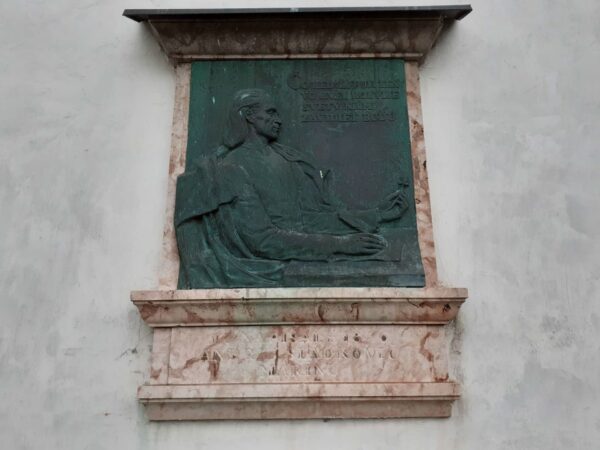Chodník slávnych
Andrej Sládkovič-AJ
Andrej Braxatoris Sládkovič
Andrej Sládkovič is one of the most important poets of the Romantic period in the history of Slovak literature. This important poet is also connected with our town, because he lived here for several years during his life.
Andrej Braxatoris Sládkovič was born in 1820 in Krupina. His childhood and student years were marked by poverty. He received his elementary education at his birthplace. He then continued his studies at the Grammar School in Krupina, later at the Evangelical Lyceum in Banská Štiavnica. He studied theology, philosophy, history and natural sciences.
His stay in Banská Štiavnica meant a lot in the life of Andrej Braxatoris. In addition to his studies, he worked as a private teacher in a family of a burgher from Banská Štiavnica, where he met his great love, Marina Pišlová. He later studied at the Evangelical Lyceum in Bratislava and at the same time attended Štúr’s historical and philological lectures. He then continued his studies at the University of Halle, Germany.
After returning from Germany, he accepted a position of an educator in the family of Peter Bezegh, a judge from Rybáre. The poet spent the most peaceful period of his life in a picturesque nature in the surroundings of our town. It was also the most creative period in which his talents were fully manifested.
It is certainly no coincidence that in 1844 one of the descendants of the old Slovak peasant family, Peter Bezegh de Hájniky, invited Andrej Sládkovič, who was already a well-known poet, as the educator and teacher of his four daughters.
Today, the Bezegh manor house in Hájniky is decorated with a memorial plaque, on which we can read:
„What if the flower-bud comes into blossom, the worlds will envy us.
Andrej Sládkovič wrote his most significat poem “Marína” here in 1846. “ However, there is no evidence in the archives that Sládkovič wrote the poem here, in the manor house.
The house in which Sládkovič lived from 1844 to 1847 can still be found on the southern periphery of Rybáre. At the entrance to the former manor house, a plaque commemorates this important historical fact.
Before he came to Rybáre, the poet had written several lyrical poems. The most extensive one was the poem „Sessions in the Dušan´s family.“
In a peaceful environment of a beautiful nature, while walking along the banks of the river Hron, the poetic talent of Sládkovič fully developed. And so the world’s most beautiful poetic compositions such as „Marína“ and „Detvan“ were born.
On the banks of the popular ˗ sometimes calm and sometimes wild Hron, under the sparkling alder trees that lined the river on both sides, even on beautiful moonlit nights ˗ the poet found inspiration to create these literary gems, which were written in Štúr´s standard Slovak. Through his beautiful literary work, the author has proofed the beauty, musicality and poetic formability of the standard Slovak.
While reading the poetic composition „Marína“, we can imagine the romantic secluded places near the old Corvinian watermill. The poet knew every curve of the Hron River. The left bank was lined with densely branched alders ˗ with a carpet of greenery ˗ interspersed with colourful wildflowers. The most romantic place ˗ Sihoť (near the old mill) ˗ was surrounded by alders and it was only accessible via a bench through the drive of a wooden mill wheel. Sihoť was said to be the most popular place of Andrej Sládkovič, a place where he enjoyed writing and contemplating about love.
The poet found an inspiration for another excellent lyrical-epic composition “Detvan” in his surroundings. The impulse for writing this composition was perhaps a visit to Detva, where he went together with the Bezegh family. In addition to beautiful folk characters, we also find a strict but fair ruler in this work. King Matiáš was highly esteemed by the Bezeghs, because according to an oral tradition, Matej Korvín had the manor house built in Hájniky, which served as a temporary residence during hunting in the surrounding mountains.
Both the poetry compositions of “Marína” and “Detvan” have been translated into several languages, but they sound most beautiful in our pleasant-sounding Slovak.
In addition, Sládkovič also wrote other poems “Nehaňte ľud môj”, “Dcérka a mať” and many others. During his stay in Rybáre, Sládkovič maintained personal and written contact with many important national personalities. He also collected and recorded fairy tales, songs and folk plays.
Andrej Sládkovič participated in the work of the Tatrín society and collaborated with Matica slovenská institution.
Later, Sládkovič became a priest in Hrochoť and from 1856 he worked in Radvaň, near Banská Bystrica.
The poet died on the 20 April 1872. Andrej Sládkovič was accompanied on his last trip by his friends and the residents from a wide area. The song „Hojže, Bože“ and the verses of the poet Ján Botto were a farewell to all native Slovaks. Memorable words that we shall remember:
„….. there will be times when the glory of Yours will be remembered for ages.“
The name of the poet Andrej Sládkovič will forever remain connected with our town and our school. We will always be grateful for the inexhaustible legacy of beauty that he has given us through his literary work.

